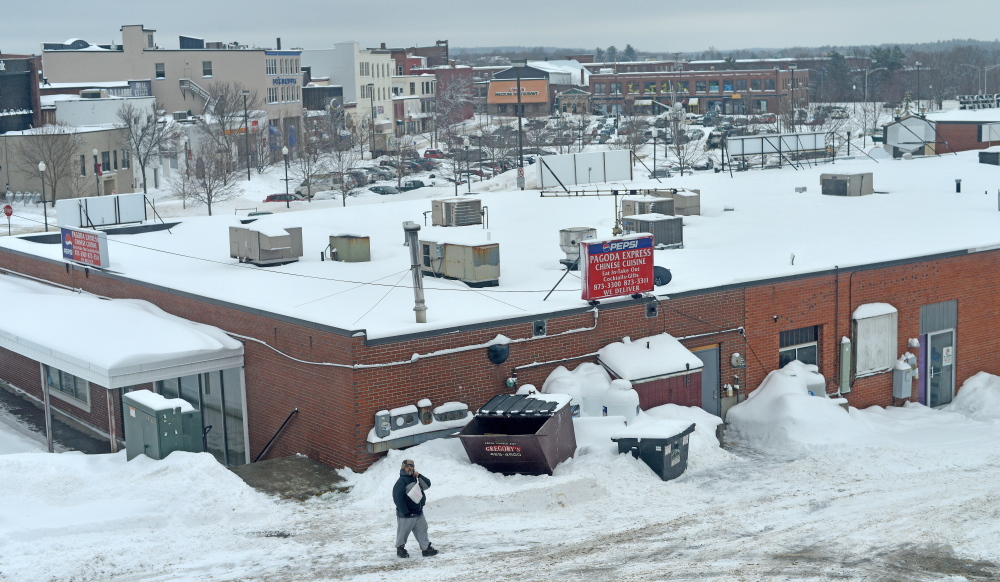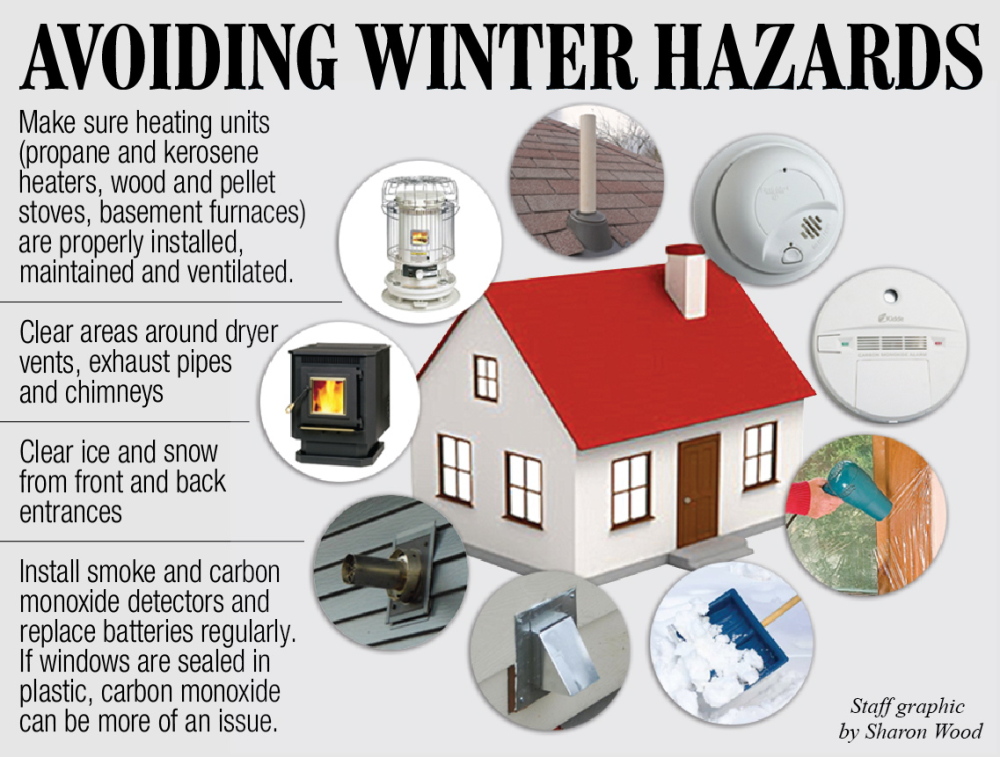Central Mainers face many hazards as snowstorms continue to slam the area — hazards that might not become apparent until something bad happens.
As the snow continues to pile up on the ground, around buildings and on roofs, fire officials and other emergency workers advise keeping snow and other materials from blocking pipes, chimneys and vents and ensuring that exposed roofs, fire escapes and outdoor stairways are shoveled and clear of ice to avoid collapse.
Smoke detectors should be installed and checked to make sure they are working.
Wood and pellet stoves and propane and kerosene heaters — and other fuel-fired devices — ought to be maintained and ventilated properly to avoid carbon monoxide problems, and people should have carbon monoxide detectors in their homes. They also should use heaters according to manufacturers’ instructions.
“Anybody who is burning anything in their house should have a carbon monoxide detector,” said David LaFountain, fire chief for both Waterville and Winslow. “Carbon monoxide is something you need to have in the back of your head and to be a little bit worried about.”
Deep snowdrifts on roofs also cause problems. Firefighters have had to clear snow from around heating, ventilation and air conditioning units on roofs, as was the case recently at the Winslow Public Library, according to LaFountain.
“We do need to be concerned that these things need to breathe, and when they’re packed in with snow, nothing good can happen,” he said.
Such units typically are installed on roofs of strip malls, shopping centers and some restaurants. If a building has no carbon monoxide detector and its heating, ventilation and air conditioning units are blocked, too little fresh air is getting in and the exhaust can’t be ventilated to the outside, LaFountain said. The situation could cause a roomful of people to start getting headaches, but they probably wouldn’t know why, because carbon monoxide can’t be seen or smelled.
In the case of the library, a patron reported smelling an odor of propane gas. LaFountain said propane actually has no odor, so a pungent gas called mercaptan, which smells like rotten eggs, is added to it so that if there is a leak or other problem, people can become aware of it.
“We’ve actually had quite a few calls between Waterville and Winslow from people complaining of propane,” he said.
When people report a propane odor, firefighters have to investigate.
“We had a line in Winslow at the mini-mall with a three-quarter-inch steel line break in a snowbank,” he said. “It leaked for three days before anyone noticed.”
Efforts to battle the extreme cold that has charactized this winter create some potential problems for the unwary.
LaFountain said a lot of people button up a house by putting plastic on windows and sealing the back door.
“If you’re putting plastic on windows to make them tighter, carbon monoxide’s going to become an issue quicker,” he said.
The door needs to be accessible, so the outside area around the door should be cleared of snow.
LaFountain said carbon monoxide detectors, which typically cost $50 or less, can be bought online or at places such as Home Depot and Lowe’s. Some are better than others, and digital detectors produce a readout so one can tell the carbon monoxide levels, whereas others just sound alarms.
If a carbon monoxide detector alarm sounds, a homeowner should call the fire department. Firefighters will respond to try to determine the cause by checking fuel-fired devices and other equipment. Sometimes the cause is the separation of pipes in wood stoves or oil-fired furnaces, or a hole that needs to be tightened, according to LaFountain.
“Lots of times it’s just an old detector that needs to be replaced,” he said.
Carbon monoxide detectors are required by law in apartments and new construction. A home may not be sold without a functioning carbon monoxide detector. The devices look like smoke detectors and typically are plugged into an electrical outlet.
HOT ASHES, FALLS, CRASHES
The Augusta Fire Department’s Deputy Chief Dave Groder reiterated LaFountain’s warnings and emphasized the importance of apartment building owners making sure fire escapes and outdoor stairways are cleared, not only because they serve as emergency exits, but also because the heavy weight of snow can cause them to collapse. Doors that open outward also must be cleared of snow, or they will not open, posing a dangerous situation, he said.
While landlords are responsible for clearing the snow and ice, those who live in the buildings also should pitch in, according to Groder.
“Tenants should have some responsibility, too, because it is their lives,” he said.
Groder also cautioned that sometimes snowplows and bucket loaders clearing snow can strike propane lines and cause leaks. Roof shoveling also can sever lines.
He issued a warning to those who have wood or pellet stoves: Make sure to place unwanted ashes in a metal container with a cover and dispose of the ashes far enough away from buildings so as not to cause a fire.
“Don’t set it on the porch,” he said.
Meanwhile, MaineGeneral Medical Center officials report an influx of people suffering all sorts of winter-related mishaps.
“We are seeing numerous slips and falls in the emergency department,” said Dr. Laurel A. Parker, assistant medical director of the emergency department.
Parker, who also is the emergency ultrasound director, said officials encourage people to be cautious, don good footwear and ensure that walks and stairs are cleared of snow and ice.
“With all the winter sports — skiing, skating, tubing, et cetera — there is also significant potential for injury,” she said. “Please wear a helmet and other appropriate protective gear. We also see injuries from motor vehicle collisions when weather conditions are poor. Again, I stress the importance of caution, going slowly and staying home unless driving is absolutely necessary.”
Amy Calder — 861-9247
Twitter: @AmyCalder17
Send questions/comments to the editors.





Comments are no longer available on this story